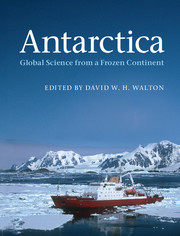Book contents
- Frontmatter
- Contents
- List of contributors
- Introduction
- 1 Discovering the unknown continent
- 2 A keystone in a changing world
- 3 Ice with everything
- 4 Climate of extremes
- 5 Stormy and icy seas
- 6 Life in a cold environment
- 7 Space science research from Antarctica
- 8 Living and working in the cold
- 9 Scientists together in the cold
- 10 Managing the frozen commons
- 11 Antarctica: a global change perspective
- Appendix A Visiting Antarctica
- Appendix B Further reading
- Acknowledgements
- Index
1 - Discovering the unknown continent
Published online by Cambridge University Press: 05 March 2013
- Frontmatter
- Contents
- List of contributors
- Introduction
- 1 Discovering the unknown continent
- 2 A keystone in a changing world
- 3 Ice with everything
- 4 Climate of extremes
- 5 Stormy and icy seas
- 6 Life in a cold environment
- 7 Space science research from Antarctica
- 8 Living and working in the cold
- 9 Scientists together in the cold
- 10 Managing the frozen commons
- 11 Antarctica: a global change perspective
- Appendix A Visiting Antarctica
- Appendix B Further reading
- Acknowledgements
- Index
Summary
We had discovered a land of so extensive a coastline and attaining such an altitude as to justify the appellation of a Great New Southern Continent.
James Clark Ross, 1847Finding the poles
There have always been those who have wanted to see over the horizon, to cross the lakes and seas, and climb the mountains. Explorers led the great migrations as humans spread across the globe, successively colonising all the continents except Antarctica, and slowly but steadily taming the wild places for their own uses. The lure of the unknown has persisted for millennia and continues to drive those today who search for new knowledge and new frontiers. Their stories have fascinated the public for centuries and no more so than those from the exploration of the polar regions.
As long ago as 1531 geographers had concluded that for the Earth to exist the two hemispheres of the globe must be balanced. If there was significant land in the north towards the pole there must be a similar mass in the south. It was but a small step then to imagine a large and populous southern continent, probably extending into temperate latitudes. Spain and Portugal had already found riches to plunder and native people to convert and subjugate in South America so perhaps, thought the geographers, Antarctica would yield a similar prize. The maps they produced in the late sixteenth century contained much cartographic speculation, which provided a stimulus for sailors from many European countries to set out across the world in search of fame and fortune. Finding Antarctica and beginning its scientific investigation would prove a lengthy business and one that would turn out to be truly international.
- Type
- Chapter
- Information
- AntarcticaGlobal Science from a Frozen Continent, pp. 1 - 34Publisher: Cambridge University PressPrint publication year: 2013
- 1
- Cited by

